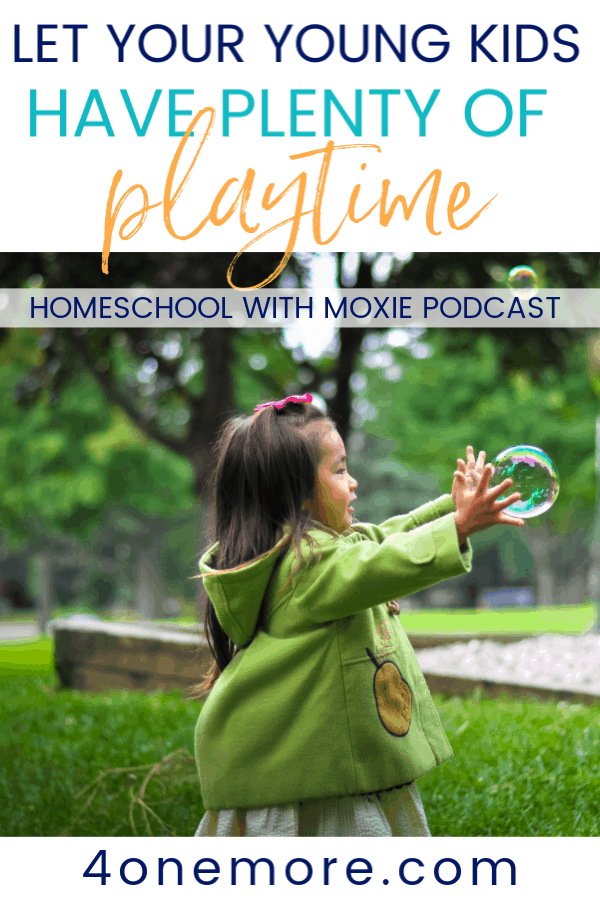Let’s dive into incredible insights on how pretend play can support your homeschool journey. In fact, imaginary play brings loads of benefits to your child’s development in ways both big and small. By the end, you’ll see why encouraging imagination is one of the best things you can do to enrich your child’s education and foster a love of learning that will last a lifetime. Let’s jump in!

My posts contain affiliate links.
The numbers don’t lie. Playtime is important for kids! There are measurable benefits to including plenty of playtime for your young kids instead of pushing academics too hard. Let’s dive into this important topic for homeschool families to consider.
HWM 48. Let Your Young Kids Have Plenty of Playtime
Just because the public schools are pushing more academics at a younger and younger age doesn’t mean you have to! The benefits of play-based learning are extensive, and the beauty of homeschooling is giving you the freedom to let your young kids have plenty of playtime!
Resources about playtime
- HSLDA The Homeschool Court Report – Q2 2019: How Early is Too Early?
- 6 Benefits of Play
- Early Childhood Development: 5 Proven Benefits of Play
- Importance of Play: 9 Amazing Benefits
- I don’t use printables (and you shouldn’t either)
- 5 More Reasons Why I Don’t Use Printables
- 6 Ways You’re Making Homeschooling Harder Than It Needs to Be
- 88 Things First Time Homeschool Moms Need to Know
HWM 293. Creekland & the Benefits of Imaginary Play in Child Development
In this episode, we’ll explore what research says about the impact of pretend play on children’s development. Studies have shown that through make-believe, children learn critical thinking, problem-solving, and self-regulation skills, all of which support their ability to work independently—a skill we know is especially important in homeschooling.
We’ll also talk about how pretend play helps kids develop empathy and social understanding, giving them the tools to better understand different perspectives and communicate effectively.
This episode discusses that:
- pretend play helps children develop important executive functions like self-regulation, working memory, and flexible thinking.
- kids who engage in imaginary play are more likely to think creatively and generate multiple solutions to problems.
- children who engage in regular pretend play have higher levels of creativity and problem-solving skills.
- children who regularly engaged in role-play scenarios had a better ability to understand others’ perspectives and emotions
Research about Benefits of Imaginary Play on Child Development
Here are the three studies we cite on the podcast if you want to dig deeper into the research:
Whitebread, D., Coltman, P., Pasternak, D.P., Sangster, C., Grau, V., Bingham, S., Almeqdad, Q., & Demetriou, D. (2012). The development of two observational tools for assessing metacognition and self-regulated learning in young children. Metacognition and Learning, 4(1), 63-85.
Russ, S. W., & Wallace, C. E. (2013). Pretend play and creative processes. American Journal of Play, 6(1), 136-148.
Lillard, A. S., Lerner, M. D., Hopkins, E. J., Dore, R. A., Smith, E. D., & Palmquist, C. M. (2013). The impact of pretend play on children’s development: A review of the evidence. Psychological Bulletin, 139(1), 1–34.
What does this research mean for YOUR homeschool?
Here’s your call to action! If this research is true, what does this mean for your homeschooling? Here are just a few suggestions to consider.
- give your kids the gift of free time and don’t over schedule them
- sometimes it’s more important to just let the kids play rather than making them come and “do school”
- look for items to encourage open-ended play – costumes, “junk box” and plenty of time outside being “bored”
- don’t always try to oversee play time, let them figure it out – especially with friends and siblings
- less screen time
- reading great books gives inspiration for play
